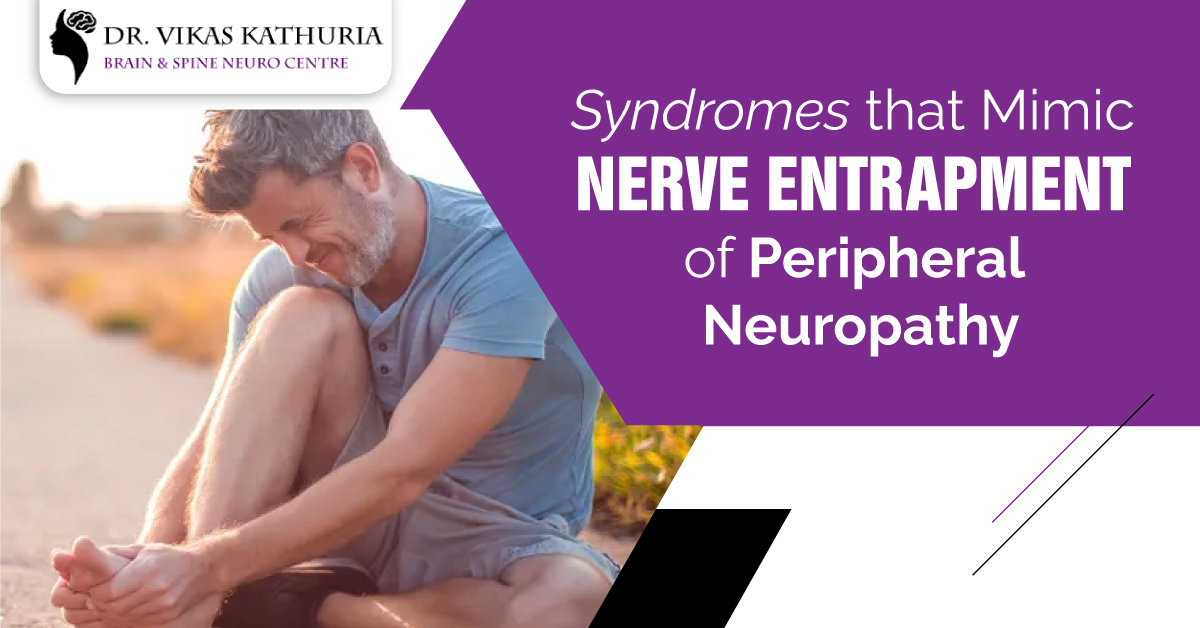Syndromes that Mimic Nerve Entrapment of Peripheral Neuropathy

Weakness, numbness, and pain typically manifest in the hands and feet due to peripheral neuropathy caused by damage to the nerves outside the brain and spinal cord. It can also affect other areas and physiological functions, including digestion, urine, and circulation.
The brain and spinal cord (the central nervous system) communicate with the rest of the body via the peripheral nervous system. The peripheral nerves also convey sensory information to the central nervous system.
Injuries, infections, metabolic issues, genetic predisposition, and toxic exposure are all potential causes of peripheral neuropathy. Diabetes mellitus is a leading contributor.
The pain from peripheral neuropathy is often described as sharp, burning, or tingling. When the underlying cause is addressed, symptoms usually subside. The discomfort caused by peripheral neuropathy can be mitigated by medication and proper peripheral neuropathy treatment in Gurgaon.
Symptoms
Since the nerves in your periphery each have a unique purpose, the symptoms you experience will vary from case to case. 
- Sensory nerves get information from the skin about things like temperature, discomfort, vibration, and touch. 
- Motor nerves direct muscle activity.
- Autonomic nerves regulate blood pressure, sweat, heart rate, digestion, and urination.
Some of the symptoms of peripheral neuropathy could be:
- A gradual onset of numbness, tingling, or prickling  in your hands or feet, which can spread upward into your arms and legs; 
- Extreme sensitivity to touch; 
- Sharp, throbbing, jabbing, or burning pain; 
- A lack of coordination and falling; 
- Pain when it shouldn’t be there, such as pain in your feet when putting weight on them or when they’re under a blanket;¬†
- Muscle weakness.
- If motor nerves are damaged, paralysis will occur.
Symptoms of autonomic nerve dysfunction include:
- The inability to tolerate heat
- Profuse sweating, or inability to sweat at all
- Gastrointestinal, urinary, or genitourinary issues.
- Lowered blood pressure can lead to fainting
Multiple mononeuropathies affect two or more nerves in separate locations, while mononeuropathy affects a single nerve (polyneuropathy). One form of neuropathy is carpal tunnel syndrome. Polyneuropathy is the norm for those who suffer from peripheral neuropathy.
Predicting When You Should See a Doctor
If your hands and feet have been feeling numb, weak, or painful, you should see doctors for Peripheral Neuropathy in Gurgaon immediately once. Your best chance of managing your symptoms and avoiding permanent damage to your peripheral nerves lies in Dr. Vikas Kathuria’s prompt diagnosis and treatment.
Causes
Damage to the peripheral nerves, known as peripheral neuropathy, can result from various diseases and disorders. Peripheral neuropathy can be brought on by various medical issues, including 
- Autoimmune disorders: Chronic inflammatory demyelinating polyneuropathy, vasculitis, Guillain-Barr√© syndrome, lupus, rheumatoid arthritis, and Sjogren’s syndrome are all autoimmune diseases.
- Diabetes: This is the most common cause. More than half of those who have diabetes will eventually experience neuropathy.
- Infections: These include certain bacterial or viral infections and shingles, including Lyme disease, hepatitis B and C, Epstein-Barr virus, diphtheria, leprosy, and HIV.
- Tumors: Both malignant and benign tumors have the potential to form on nerves or exert pressure on them. Polyneuropathy can develop from immune-related malignancies as well. Paraneoplastic syndromes like these are forms of degenerative diseases.
- Diseases of the bone marrow: Monoclonal gammopathies, myeloma, lymphoma, and amyloidosis are all examples of diseases caused by aberrant proteins in the blood.
- Diverse illnesses: Some examples are kidney disease, liver disease, connective tissue disorders, and hypothyroidism (hypothyroidism).
Possible dangers
Rheumatoid Arthritis
Lisak described peripheral neuropathy associated with rheumatoid arthritis in 2014. Peripheral neuropathy develops in 10% of patients with rheumatoid arthritis. Distal sensory/motor polyneuropathy, distal sensory neuropathy, and mononeuropathy multiplex are all present. Ulnar neuropathy and entrapment of the median nerve are also seen.
Type 2 Diabetes
Up to half of all people with type 2 diabetes will develop peripheral neuropathy. Acute sensory neuropathy causes excruciating pain in the lower limbs. In contrast, chronic sensorimotor neuropathy is often asymptomatic and grows slowly, leading to autonomic dysfunction and the potentially fatal complications of ulceration and amputation.
- Diabetic mononeuropathy causes discomfort, develops rapidly, and resolves independently within six weeks.
- In 2004, Vinik et al. defined the second kind of entrapment neuropathies. Entrapment develops over time and continues if nothing is done about it. Carpal tunnel syndrome, ulnar neuropathy, entrapment of the peroneal nerve, meralgia paresthetica of the lateral femoral cutaneous nerve, and tarsal tunnel syndrome are the most typical entrapments.
Abuse of Alcohol
25%-66% of chronic alcoholics get some degree of peripheral neuropathy, making it the most prevalent adverse impact of alcoholism. This peripheral neuropathy is the hallmark of dysesthesias, distal lower extremity paresthesias, and weakness. Symptoms of paresthesia typically start in the feet and spread symmetrically up the legs. Ataxic gait manifests as a lack of balance and wobbliness, leading to difficulty walking or frequent falls.
Twenty million Americans suffer from peripheral neuropathy, and the illness is anticipated to worsen, with 86 million Americans (more than one in three adults) estimated to be pre-diabetic. Nine out of 10 people in this category are oblivious to the fact that they have the disease. Differential diagnosis is vital, as, in the following years, the Best Neurosurgeon in Gurgaon may expect to treat peripheral neuropathy in growing numbers of patients.
